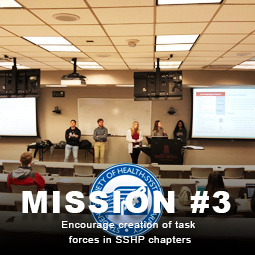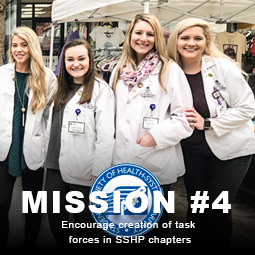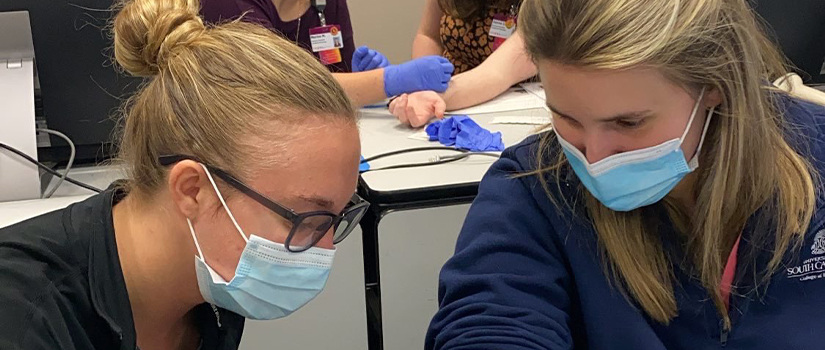Educational Task Force News
Follow our local Student Society of Heath-System Pharmacists (SSHP) educational task force as they engage and inform communities about penicillin allergies.
Mission 1: Raise Awareness in Columbia at Soda City

The USC Student Society of Heath-System Pharmacy (SSHP) chapter created an educational task force to inform the community about penicillin allergies. Their first event was Saturday, November 3, at Soda City Market on Main Street in Downtown Columbia. The task force, accompanied by professors Julie Ann Justo and Hana Rac, set out to ask a simple question, “Are You Truly Allergic to Penicillin?” Seventy-one market attendees approached the booth to find out the answer.
Many of the booth visitors had questions about their own penicillin allergy or an allergy of a family member or friend. After task force members inquired when and how the reactions presented, a common theme from the public included reactions that occurred at a young age with nonspecific rashes, or stomach upset. Visitors to our booth were surprised to learn that after 10 years, even with a true allergy, up to 80% of patients lose their sensitivity. The task force also clarified the difference between drug side effects and allergic reactions.
During their time at the market the task force, with the help of Professors Justo and Rac, de-labeled two penicillin allergies. A ten-year old girl and her mother came to the booth to inquire about the girl’s allergy. She was labeled penicillin allergic at the age of 5 when she had a nonspecific reaction believed to be caused by the drug. The task force began to ask about her medication history. Her mom remembered many of the antibiotics the girl had taken over her lifetime including Omnicef and Rocephin - cephalosporin antibiotics which have similar structures to penicillin and a small chance of allergic cross-reactivity. At the end of the conversation, the mom briefly mentioned that the girl had also taken and tolerated Augmentin, which is a combination drug of amoxicillin and clavulanic acid. Additionally, a college-aged boy was de-labeled at our event after a brief investigation into his medication history based on his use and tolerance of amoxicillin in the past. Commonly, patients do not realize that amoxicillin is a penicillin antibiotic. If a patient who is labeled as penicillin allergic can tolerate amoxicillin, then they are no longer allergic to penicillin. With the right questions, pharmacists can remove their patients’ penicillin allergic labels allowing the use of more effective therapy and decreasing antibiotic resistance.
Furthermore, the task force excitedly discussed the penicillin allergy skin test and the role that pharmacists can play. It is currently available in select hospitals and clinics within South Carolina, with pharmacists administering the test in some of these settings. Many people were curious to hear about this one-hour test to determine true allergies that consists of a two-step process, including scratch testing and intradermal testing.
The SSHP penicillin allergy educational task force enjoyed helping the community investigate their penicillin allergies and can’t wait to continue educating Columbia residents at upcoming events.
Obtain a copy of the handout that was dispersed.
Olivia Alewine, Pharm.D. Candidate, Class of 2021
Alexis Caronis, Pharm.D. Candidate, Class of 2021
Mission 2: Encourage creation of task forces in SSHP chapters

Members of our Penicillin Allergy Educational Task Force traveled to the 2018 American Society of Health-System Pharmacists (ASHP) Midyear Clinical Meeting in Anaheim, California. The task force presented at the Student Society Showcase about their first outreach mission at Soda City which they completed in November 2018. They discussed their inspiration for creating the task force and outcomes from the event with students from other chapters, as well as pharmacists from all over the world.
The Student Society Showcase is an annual event for all of the Student Society of Health-System Pharmacists (SSHP) chapters from around our country to highlight their achievements and share valuable ideas, practices, and programs with other chapters. The goal is that chapters can create and apply new, successful programs on their own campuses benefiting their SSHP members through collaboration with other chapters.
Our task force was eager to share our unique event with other chapters and help supply them with the resources needed to initiate a similar program of their own, thus increasing the penicillin allergy education to areas outside of our local Columbia and South Carolina community. During the showcase, the task force spoke with SSHP chapter presidents from different states, like Oregon and Rhode Island, about how they implemented this program at the University of South Carolina College of Pharmacy.
The task force created a handout to provide other chapters the details of creating a task force, the importance of raising awareness about improper labeling of patients with a penicillin allergy, and our specific outreach event. Improper labeling is an issue that is ubiquitous around the globe that affects patient outcomes and healthcare costs. Having the opportunity to discuss how, even as pharmacy students, these SSHP chapters can make a difference in patients’ health outcomes is a great experience and why we wanted to share our program with other chapters on a national platform.
Not only were students interested and inquisitive, but pharmacists were as well. One pharmacist in particular had questions about the scope of practice for pharmacists in South Carolina. This created an opportunity to discuss the penicillin allergy skin testing legislation that was recently passed in our state and how pharmacist-led penicillin skin allergy tests can be beneficial in the healthcare field.
The Student Society Showcase was an amazing opportunity for the task force to learn from other students and their chapter’s ideas, in addition to spotlighting penicillin allergy education. Now that we are back in Columbia we look forward to continuing patient education and increasing our outreach through community outreach programs.
Lauren Moran, Pharm.D. Candidate, Class of 2021
Mission 3: Train and educate students to volunteer

With the massive successes that came about at the initial Student Society of Health Systems Pharmacy (SSHP) Penicillin Allergy Educational Task Force event held at Soda City in Columbia, SC, and the national presentation of our mission at the annual Student Society Showcase, our group sought to bolster the campaign with help from current SSHP members to increase our outreach. After overwhelmingly reaching more than 70 people at the first event, the educational task force enlisted help to ask and answer the question of, “Are you truly allergic to penicillin?” Prior to the second Soda City event, the group reached out to the current members of SSHP at the University of South Carolina College of Pharmacy to gauge the overall interest in participating in such events throughout the academic year and the results were somewhat shocking. A whopping 15 members expressed interest in the community outreach project and signed up to participate in the next Soda City Market event in February 2019.
Gearing up for future events, the Task Force members implemented a training program for the interested members to complete prior to speaking with members of the community. Training topics consisted of locating reference materials, statistics of penicillin allergies, general pharmacology information of penicillin antibiotics, the role of a pharmacist in inpatient penicillin allergy skin testing, and antimicrobial stewardship efforts.
All members who were interested in participating in at least one event throughout the year were added to a group on the Blackboard educational platform, through which they were provided information about the task force mission and resources to aid in their personal development as a volunteer. Additionally, the task force members collectively created a proficiency exam to ensure that all volunteers were equipped with the skills and knowledge to provide accurate and relevant information required to respond appropriately to inquiries at the events. At the educational meeting held prior to the outreach event, members of the Task Force presented the materials to the volunteers in an informational and scenario-based format that was designed to prepare them for real situations and tough questions that they may encounter at the event.
In a feedback survey, one volunteer stated, “I found the training session very beneficial, along with the resources provided. It made me feel more prepared to spread awareness, especially since I'm a P1 (first year pharmacy student) and haven't learned as much about it.” Overall, all of the volunteers were in agreeance that the educational training session prepared them to educate the public about penicillin allergy truths, myths, and misconceptions.
Through this program, the goal of the task force was to spread our mission of penicillin allergy education to the members of SSHP and to allow for more people to volunteer and engage in community outreach. It was the consensus of the Penicillin Allergy Educational Task Force that volunteers should collectively be well versed in the topics of penicillin allergies and well equipped with quick resources and reference materials to provide accurate and unbiased information to adequately ask and answer the question, “Are you truly allergic?”
Austin Williams, Pharm.D. Candidate, Class of 2020
Mission 4: Host Practice Advancement Initiative Week event

The Practice Advancement Initiative (PAI) week was created by the American Society of Health-System Pharmacists (ASHP) to showcase the role of pharmacists as direct patient care providers in health-systems. It is defined by ASHP as “a professional-led initiative that is empowering pharmacists to take responsibility for patient outcomes in acute and ambulatory care settings.” This year PAI week took place during the week of February 18th. During its PAI week event, the penicillin allergy educational task force chose to focus on the pillars of leadership in medication use, pharmacist credentialing and training and care team integration.
The task force returned to Soda City Market to spread awareness and educate patrons about penicillin allergies. Accompanied once again by Dr. Julie Justo, students spoke with market attendees about their possible allergies or the allergies of friends or family members.
As the second event of this kind, the task force expanded to include more volunteer members from the P1, P2, and P3 classes. Earlier in the month, SSHP held a training and education seminar and prepared new task force members, 16 of which attended the February 23rd event, to counsel people curious about their suspected allergies. Leaders of the task force discussed the typical presentation of allergies, the most common symptoms mistaken for allergy symptoms, the range of medications containing the beta-lactam ring structure responsible for penicillin allergy, as well as the penicillin allergy skin test, where it is being offered, and the role of pharmacists in its administration.
At Soda City Market, the task force spoke with 80 attendees about their allergies and the symptoms they experienced after taking penicillin or related antibiotics. As was the case at the first event, many of those who were labeled as penicillin allergic experienced their reactions at a young age and could not remember the details of their reactions. Most were surprised to learn that it was possible to lose their sensitivity to penicillin antibiotics after many years and were equally surprised that a simple skin test could be performed to determine if they are currently allergic. Of the 80 people that were counseled, two were de-labeled after it was discovered they tolerated a penicillin antibiotic and 8 were referred to a local allergist for possible skin testing.
The task force also spoke with a young adult female who had been told she was allergic to penicillin and had a reaction in early childhood; however, she did not remember the reaction and her parents could not remember the details either. During the discussion, she revealed that she had taken and tolerated a cephalosporin antibiotic. After being told of their similarities, she inquired about ways to find out if she is allergic to penicillin. Though she could not be de-labeled from this information alone, she was informed that skin testing may be appropriate, and she was referred to an allergist for further investigation.
Over the course of the event, many people from many different backgrounds approached the booth. A favorite event for Columbia natives, Soda City draws locals and visitors from out of town and several of those visitors came with questions about their allergies. One mother from New York spoke with the task force about her son’s penicillin allergy. He had been given two separate penicillin antibiotics within the last five years. The first produced a reaction with hives and the second resulted in difficulty breathing and a hospital visit. The mother was counseled about the variety of penicillin antibiotics and encouraged to ensure her son’s allergy was documented with his health care providers and pharmacy at home. She was also praised for keeping detailed personal records of the events, including the names of the medications, descriptions of the reaction, and sharing that information with her son. The interaction with this family showed how grass roots involvement in the community can encourage helpful practices to prevent future adverse events and have a greater impact than one might expect.
Overall, the PAI week event and second visit to Soda City reproduced the success of the first visit and gained much more student involvement than the first. The task force expects to return to Soda City in the future and is eager to expand its reach.
Ryan McCormick, Pharm.D. Candidate, Class of 2022
